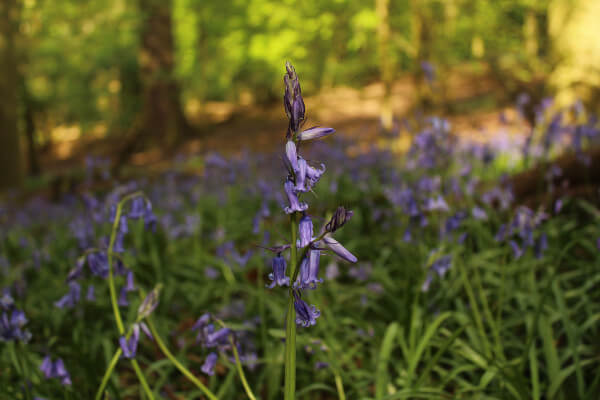Plea to Dog Owners to Help Keep Wildlife Safe this Spring

Herts and Middlesex Wildlife Trust is asking dog owners to support them to help keep wildlife safe this spring.
Springtime sees a rush of activity in nature – wildflowers are shooting, birds are nesting and species are emerging from hibernation. The Trust is urging us all to minimise wildlife disturbance and asking dog owners to keep dogs on short leads when walking through its nature reserves and other wild places, where wildlife should be free to thrive.
Where dogs are allowed to run loose, they can cause significant wildlife disturbance – this is particularly problematic when species are vulnerable either on or near the ground. Bluebells are a case in point – many people enjoy the spectacle of visiting woodlands carpeted blue but these delicate wildflowers can be damaged by dogs, as well as humans, trampling on them. Breeding birds are also at risk, with ground-nesting birds particularly so. Nests can be trampled upon, scaring adults away from their young and, if left alone for too long, the vulnerable chicks can perish. Species such as Curlew, Corn Bunting and Skylark need all the help they can get, with research showing that 66% of ground-nesting birds are in decline in the UK, compared to 31% of other species. When wildlife is disturbed by dogs, it can also affect breeding, as well as feeding and foraging behaviour.
Just by taking a few simple steps, dog owners can do their bit to help wildlife:
- Keep dogs on short leads on nature reserves and in the wider countryside to keep wildlife safe and to reduce the risk to them and other animals, where grazing livestock are present
- Stay on pathways to avoid disturbing wildlife on or near the ground
- Clean up after your dog and dispose of dog waste in bins or at home to avoid contamination – dog waste can carry diseases, scare away animals and fertilise soils, affecting the natural balance of fragile habitats
- Prevent dogs from jumping in ponds or rivers to avoid disturbance to aquatic wildlife and the potential pollution of waterways from insecticides found in, for example, dog flea treatments
- If you are walking large groups of dogs, please avoid nature reserves and consider a more suitable place to exercise them to enable wildlife to flourish
Steven Werrell, Senior Project Officer with the Trust’s Nature Reserves Team says: ‘It’s great so see people enjoying our nature reserves and other wild spaces while walking their dogs, but we ask them to do so responsibly. Wildlife is suffering huge declines and dogs in wild places can cause problems, especially in spring and through to the end of summer when there’s a lot of activity in nature and many species are breeding. Simply by keeping dogs on leads, sticking to marked paths and clearing up as we go, we can lessen the impact on nature and continue to enjoy all that it offers.
‘This message is particularly pertinent as we head into the Bluebell season, where we see an influx of visitors to our woodland reserves – please continue to come and enjoy this wonderful sight but be aware that close by there could be ground-nesting birds and other wildlife including amphibians and mammals.
‘When we have grazing livestock on our reserves, we urge you to keep dogs on leads for their safety as well as the other animals and to always follow the safety signs.’
Responsible dog owners who keep their dogs on leads during nature’s busy season will be helping wildlife and also following the law, which states you must keep your dog on a lead no longer than two metres between 1 March and 31 July when on any open access land to protect ground-nesting birds.
For more information about dogs on nature reserves visit: www.hertswildlifetrust.org.uk/nature-reserves/dogs-nature-reserves.
